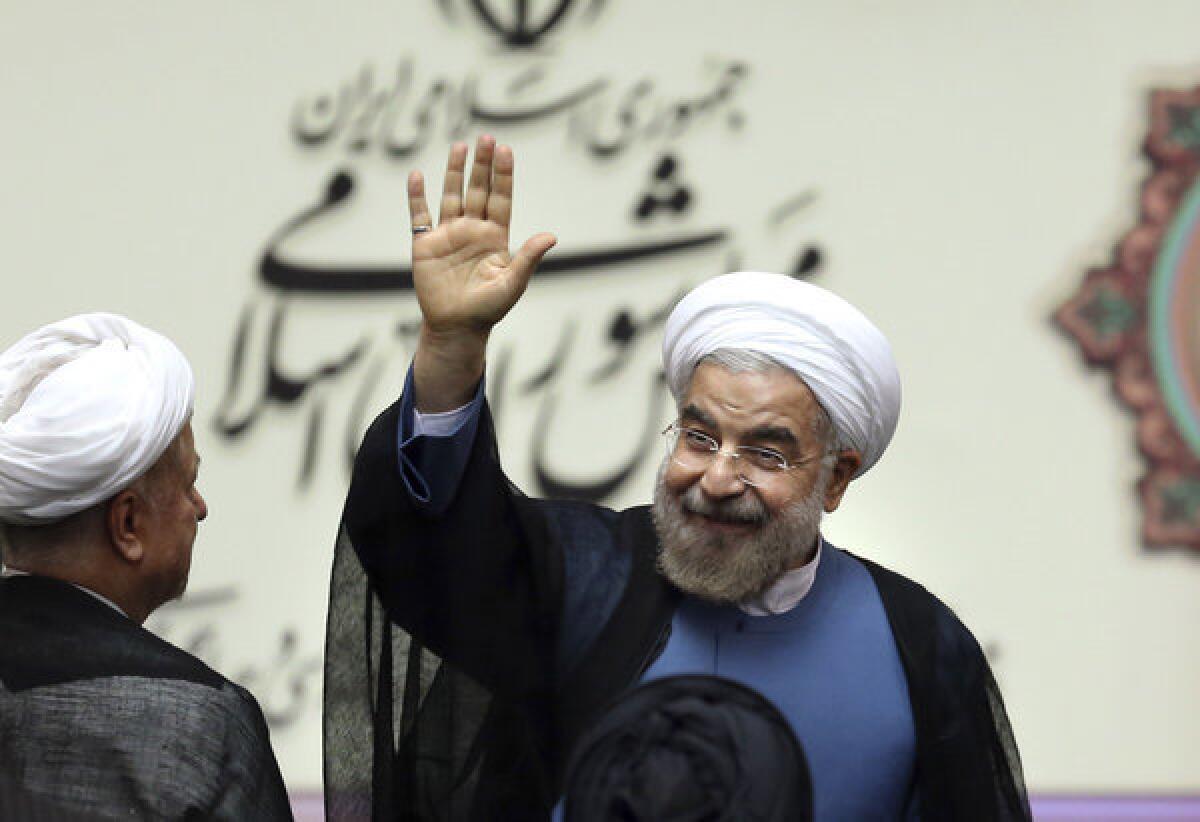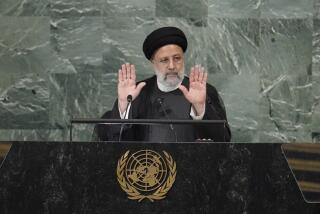New Iranian leader Rouhani assails sanctions, demands ârespectâ

TEHRAN â Iranâs new president, Hassan Rouhani, said Sunday that his nation would not be intimidated by threats and demanded ârespectâ from the global community.
âIf you want the right response, it should not be through the language of sanctions, it should be through the language of discourse and respect,â Rouhani said in a pointed message to outside nations during his official swearing in at the parliament here. âIran does not pursue war.â
Rouhani, 64, a moderate cleric who was a surprise victor in Juneâs elections, officially assumed office on Saturday but took the formal oath of office Sunday for his four-year term. The swearing-in took place in the hall of parliament, before lawmakers, government insiders and foreign dignitaries.
The presidentâs tone was conciliatory, but he stressed that Iran sought âdialogue,â not sanctions and âantagonismâ from global powers.
[Updated 11:32 a.m. Aug. 4: As Iranâs new president took office, the White House put out a conciliatory statement congratulating the Iranian people âfor making their voices heard during Iranâs election.â
Rouhaniâs inauguration, the White House said, ârepresents an opportunity for Iran to act quickly to resolve the international communityâs deep concerns over Iranâs nuclear program.â The Obama administration is still committed to a âpeacefulâ settlement if Tehran is willing to meet its âobligations,â the White House said.
âShould this new government choose to engage substantively and seriously to meet its international obligations and find a peaceful solution to this issue, it will find a willing partner in the United States,â the White House said.]
In his wide-ranging speech, Rouhani again stressed his oft-repeated themes of âmoderationâ and âprudence,â a sharp departure from the provocative style of his predecessor, two-term President Mahmoud Ahmadinejad, who was prevented by term limits from running again. The new president also pledged to work to improve civil rights for Iranian minorities and for women and to make Iran a âmeritocracy,â curbing corruption.
âThe people want to live better, to feel dignified and to enjoy benefits from a stable life,â said Rouhani, who vowed to ârestore hopeâ to fellow citizens.
Even before Rouhani assumed office, the U.S. Congress moved to tighten economic sanctions with an eye toward cutting off much of Iranâs trade in oil, its principal export. U.S.-led sanctions against Iran are already viewed as some of the harshest ever imposed and have contributed to Iranâs economic tailspin. The nation suffers from high unemployment and rising inflation, causing considerable despair, especially among highly educated young people who face reduced opportunities.
Since his election, Rouhani has said that the economic outlook is much more dire than he had believed. The new president has pledged to work to remove the âbrutalâ sanctions regime.
The U.S.-led sanctions are tied to Iranâs controversial nuclear program, which Tehran says is strictly for peaceful purposes. U.S. officials suspect Iran may be seeking nuclear weapons capability. Rouhani, a former chief Iranian atomic negotiator, has vowed greater openness about the countryâs nuclear research efforts. He did not mention the nuclear program directly in his swearing-in discourse, but the issue provided a backdrop to the sanctions discussion.
Inside Iran, hard-liners have pointed to the congressional move to tighten sanctions as an indication that Washington is not interested in negotiation on the nuclear issue. The Obama administration says it seeks a negotiated settlement to the nuclear dispute, but has not ruled out an attack on Iranâs nuclear facilities.
As a self-described moderate, Rouhani must walk a fine balance between conservative hard-liners who hold the reins of power and so-called âreformistsâ who helped put him in office and back opening up the system to change and improved international relations.
During Sundayâs swearing-in ceremony, President Rouhani also named his top staff and nominations for his Cabinet. Most nominees were well-known figures from previous governments, many of them Western-educated. For the post of foreign minister, Rouhani nominated Mohammad Javad Zariv, a U.S.-educated former ambassador to the United Nations who is viewed as a supporter of reconciliation with the West. The Parliament must approve ministerial nominations.
ALSO:
Brazil court sentences 25 police officers in 1992 prison massacre
Zimbabwe President Robert Mugabe reelected; opponents cry foul
Stoli boycott targets Russian anti-gay law -- but hits Latvian vodka
Special correspondent Mostaghim reported from Tehran and staff writer McDonnell from Beirut.
More to Read
Sign up for Essential California
The most important California stories and recommendations in your inbox every morning.
You may occasionally receive promotional content from the Los Angeles Times.










